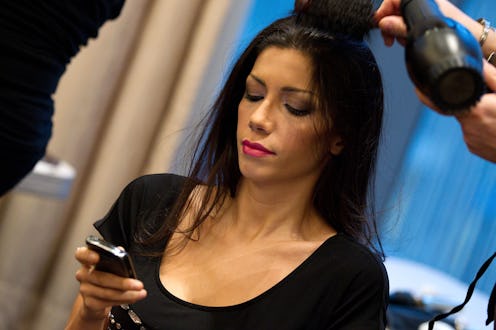Life
This Campaign Totally Failed Women In STEM Fields
Sometimes it's the thought that counts. Other times, like with IBM's #HackAHairDryer campaign, it's clear that there was little to no thinking involved in the planning process in the first place. In theory, the campaign's heart is in the right place; IBM planned #HackAHairDryer as a way to support and encourage women in STEM fields, which are still hugely, disturbingly male-dominated. However, they went about it in possibly the most harmful way possible: By perpetuating gender stereotypes and condescending to the very women they were trying to encourage.
IBM pulled the #HackAHairDryer campaign earlier this week; they also apologized for for the misstep in a statement to the Huffington Post. "The videos were part of a larger campaign to promote STEM careers," the company wrote HuffPo via email. "It missed the mark for some and we apologize. It is being discontinued."
As shown by the social media response to the campaign, "some" might mean "virtually every women in STEM fields with a Twitter account." When #HackAHairdryer launched in October, the very women targeted by the campaign took to Twitter for some good, old-fashioned mocking, pointing out that women in STEM typically have more important things to worry about than the state of their blowout.
The ridicule was so incisive, it's almost enough to make you feel sorry for IBM. No matter how admirable the company's intentions were, though, they don't erase the fact that #HackAHairDryer blithely reinforced gender norms by assuming women need to be enticed to STEM fields through its applications for cosmetics, rather than a love for science and technology. Are there women in STEM who enjoy doing their hair and makeup? Of course — just like how there are men who feel the same way. The difference is that nobody's trying to appeal to them by using beard trimmers.
IBM is hardly the first company to totally miss the mark on the subject; just earlier this fall, energy company EDF elicited a collective groan heard 'round the Internet with their campaign #PrettyCurious. Just like #HackAHairDryer, the campaign was created with the goal of increasing women and girls' interest in STEM, but — also just like #HackAHairDryer — people took issue with its attempt to "girlify" the fields.
In a statement to the Guardian, EDF noted that the name of the campaign was intended to tackle sexism in STEM:
It's not about being "pretty"; it's about being "pretty curious." Using "pretty" is a play on words. We are using the word in the sense of "pretty serious," "pretty practical," "pretty inspired," "pretty important," and "pretty curious." It's been chosen purposefully to challenge the stereotypes around personal appearance that are often applied to girls. We knew the name would attract attention and chose it in order to raise awareness of the campaign, which aims to address the significant under-representation of women in STEM.
But the message, intentional or not, sent by campaigns like #HackAHairDryer and #PrettyCurious is clear: Women should pursue their interests in STEM fields, but not at the cost of their adherence to gender norms. Be smart, but also pretty. Be curious, but don't forget to do your hair. Rather than loosening as more women enter the workforce, expectations for women are merely piling on top of each other: We're expected to be beautiful and career-oriented and family-focused, all while maintaining a Cool Girl vibe. Those expectations are not helpful — and, indeed, ultimately shouldn't exist at all.
In the face of such overwhelming gender bias, it's no wonder that women make up just a quarter of the STEM workforce, or that the campaigns encouraging them fall prey to gender norms. This doesn't mean the people and organizations behind them are sexist; IBM has a long history of successfully supporting women in STEM through initiatives like 26x26 — not to mention they're one of the only tech companies with a female CEO, Ginny Rometty. However, the abject failure of #HackAHairDryer and other campaigns like it makes it clear that gender bias won't be easily overcome. Fortunately, the badass ladies in STEM are doing their best to change things from the inside, just by being themselves.
Image: Giphy
